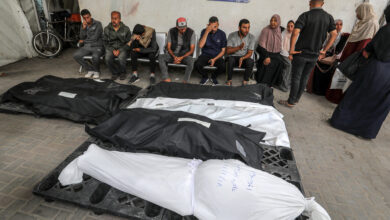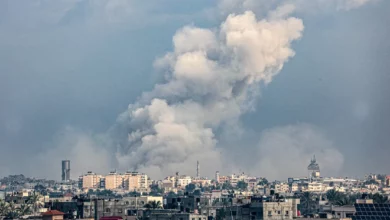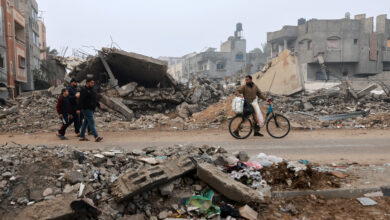News from Lebanon, Gaza and Iran featured prominently in the regional Arabic press this week, in a panoramic view of prevalent internal conflicts tied to the complexities of regional alliances.
The speech of the Lebanese militia Hizbullah leader Hassan Nasrallah on the occasion of the Shia mourning day ‘ashura captured the attention of many Lebanese papers. The Beirut-based al-Akhbar, among others, shed light on Nasrallah’s message to Christian factions, calling on them to unite and work together. Leaders of Christian factions such as the Lebanese Forces and al-Kataeb Party received his call negatively, questioning his legitimacy to make such a call. The office of al-Kataeb read an unacceptable tone in Nasrallah’s speech, which, according to a statement issued by the party, demonstrated the lack of national unity within the Lebanese government and brought out the power imbalance with the militia maintaining its arms possession. Samir Geagea, leader of the Lebanese Forces similarly denounced the call by Nasrallah, given Hizbullah’s agenda, which is laden with regional issues that do not concern Lebanon’s internal politics, such as the Palestinian conflict.
The Palestinian conflict itself was also covered extensively this week in the regional press, with a peg on Egypt’s iron barrier, to be built on the border town of Rafah to circumvent smuggling into Gaza. In the London-based al-Sharq al-Awsat, Abdul Rahman al-Rashed wrote that the Egyptian policies vis-à-vis its common border with Gaza need to be clearer, especially with regards to what can go through the border and what can’t, noting that humanitarian, medical and complementary goods should be allowed, without jeopardizing the country’s legitimate right to protect its border, regardless of the identity of its neighbor. Al-Rashed added that Egypt’s current ambiguous policies are capitalized upon by both the Hamas regime in Gaza and the Israeli government in Tel-Aviv, saying “Israel wants to tarnish the reputation of the Egyptian government by insinuating that it is the border policeman… Similarly Hamas wants to tarnish the Egyptian authorities’ reputation by cornering it.” Hamas’ position against the wall comes out clearly in a report by the Algerian daily al-Chorouk which covered a forum held at its headquarters featuring the two Hamas leaders Moushir el-Masry and Ismail el-Ashqar. “It’s an iron wall that is part of a four-year-long unjust siege, to which Arab states are contributing, including the head of Palestinian National Authority Mahmoud Abbas Abu Mazen,” el-Ashqar said at the forum. El-Masry said that the wall initiative is the product of American-Israeli pressure on Egypt, whose border control operations failed to curb smuggling activities comprehensively.
Regional papers also shed light on demonstrations led by the Iranian Green revolution opposition group and others against the regime, which cost 15 people their lives. Papers basing their coverage on Iranian news agencies reported Iranian President Ahmadi Nejad as describing the incidents as “a disgusting farce” and as a “plan driven by the Americans and the Zionists.” In an editorial by Khudeir Buqayla, in the London-based al-Quds al-Arabi, he ridiculed the Iranian regime for describing the political mobility taking place in the country as the product of Western espionage. According to Buqayla, the Iranian regime is obsessed with its nuclear conflict with the West, which has reached a peak during Nejad’s term. Accordingly, any domestic forces mobilizing against the regime are seen through the lens of conspiracy as Western allies. “More than 30 years mark the age of the Iranian revolution and are enough for the Mullahs’ regime in Teheran to stop and recognize its mistakes,” he wrote. He also noted that the legitimacy that the Iranian regime enjoys among certain popular forces and Arab and Muslim regimes, particularly for its antagonistic position to the West, cannot be used as an excuse for cracking down on domestic opposition.
On the Maghreb side of the Middle East’s map, the long-term contention around the Western Sahara’s quest for self-determination is still making headlines. Algerian papers, unlike their Moroccan counterparts, gave some attention to the return of Western Sahara activist Aminatou Haidar to her city Laayoune. Haidar went on a hunger strike for 32 days after the Moroccan authorities confiscated her passport upon her return from a trip to the United States where she received a human rights award. The Moroccan authorities denied Haidar entry into her city on the basis that she rejected her Moroccan nationality. Haidar, whose return came following nternational mediation, has received praise from the people of the Sahara, who according to the Algerian daily al-Chorouk, took to the streets in celebration of her bravery. On the same front, the Moroccan daily al-Maghribia reported on the establishment of an independent forum whose aim is to mobilize the people of the Western Sahara around their quest for self-determination, including non-Polisario supporters and people from the camps of Tindouf, in southern Algeria.




